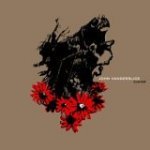
John Vanderslice Cellar Door
(Barsuk)
Cellar Door is not a happy album. John Vanderslice's fourth solo effort is awash in ruminations on war, death, and family - often linked together in the most bizarre of ways. Birds are blown apart by gunshots, drug addicts steal from their parents, fathers are called to morgues to identify their presumed sons, and prisoners are tortured. It's wholly appropriate that one of the songs explicitly references Requiem for a Dream (the movie for which Jennifer Connelly should have won her Oscar, not A Beautiful Mind); like that film, Cellar Door takes disturbing imagery, and molds it into an artistic statement that stays with you long afterwards. The difference between the two that is unlike the film, which doesn't sugarcoat anything, Vanderslice's pop is anything but unpleasant - his gifts for melody and off-the-wall arrangements are in stark contrast to his subject matter. Vanderslice's self-professed "sloppy hi-fi" approach (achieved with collaborator Scott Solter) is a red herring; his records are just as carefully orchestrated as any Trevor Horn mega-production, only much more palatable, analog rather than digital. Just one look at the instruments used, everything from ancient Moog, Mellotron, and ARP synths, to Portuguese guitars and vibraphones, not to mention the detuned fireplace (no really, it's listed in the credits) proves that Vanderslice can not only throw a kitchen sink at the wall, but have it land there with plumbing intact.
Despite the obvious connections in the lyrics, Cellar Door isn't a full-blown concept album, as were Vanderslice's two previous records. There's no story, just themes that run through the record. The opening track, Pale Horse, is an adaptation of a poem by Percy Blyth Shelley, filled with violent imagery (a bit of a trend here, as the first song of last year's The Life and Death of an American Fourtracker used William Blake).
Central to the album are the three songs that deal directly with war - three different wars, to be precise. Of the three, Heated Pool and Bar, which deals with current day US operations, is the least effective, its characters committing their unspeakable acts with the most amoral (not immoral) of attitudes. I suspect that's exactly what Vanderslice is trying to get across, but it doesn't quite work. The other two, though, are stunners. White Plains ranks with Springsteen's Shut Out the Light and Steve Earle's Johnny Come Lately as among the best songs I've ever heard about returning Vietnam vets. The narrator's restlessness runs through the song, but you never find out why until the nightmares appear in the harrowing final verse. June July references an even earlier war, as its modern day narrator is hit by lightning while walking on a preserved Civil War battlefield. His miraculous survival, on a site where so many men once died, serves as a counterpoint to the often tragic scenarios of the other songs; its place as the final track, where it leaves the listener with a bit of hope, is obviously not an accident. Musically, it's the most inspired song here, and that's saying something, an unbelievably pretty, tranquil melody nestled in acoustic guitars and strings.
Cellar Door treats some pretty serious subjects, but it's anything but a downer. Vanderslice has a quirky sense of humor, and a love of the absurd. Combined with his immense gift for production and arrangement, these make Cellar Door a hummable joy, even if you're humming lyrics about senseless cruelty.
12 March, 2004 - 00:00 — Robert Allen